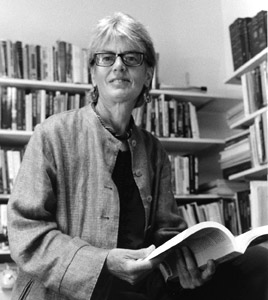 |
|
||
|
Vol. V No. 6 · 21 September 2001 |
|||
B.U. Bridge is published by the Boston University Office of University Relations.
Starving
for the truth
Diana Wylie's book examines history of hunger and racism in South Africa
By Brian Fitzgerald
If you were to write a history of a country's past 100 years, would you focus on food? That is what Diana Wylie did when she penned a book about South Africa that examines the politics of hunger and the uses and misuses of nutritional and agricultural science.
|
|
|
|
CAS
Associate History Professor Diana Wylie. |
|
Wylie, a CAS associate history professor, looks at the consequences of an industrial revolution that took place in a colonial setting -- and the changing quality of life in a country that had been long known for its racist tyranny.
The idea of writing Starving on a Full Stomach: Hunger and the Triumph of Cultural Racism in Modern South Africa (University Press of Virginia, 2001) first came to Wylie in 1979 while waiting at London's Heathrow airport for a plane that would take her to southern Africa for the first time. "An elderly Anglo-South African woman began to address me on the food black South Africans eat," she says. "The woman told me, 'We are trying to teach them to eat brown bread, but they insist on white.' I would hear this tone of weary paternalism again and again."
Wylie says that white dominance relied on ideologies of African scientific ignorance and of white benevolence. Such paternalism goes back at least to 1910, when South Africa became an independent country. A government official wrote then to hungry rural Africans, "I am distressed at the sufferings of my children . . . But while I sympathize . . . I cannot but remember that it is partly their own lack of foresight that has brought them to their present extremity."
While many white politicians saw black South Africans as child victims and voiced dismay that they were hungry, they believed that this state of affairs had come about because the "children" didn't know how to feed themselves properly. They saw black poverty as a cultural trait rather than the result of the country's failed political and economic policies.
But that's not to say that this attitude was designed to oppress, says Wylie. "I'm trying to show how modern ideas that we might think are fruitful and value-free can actually cause social damage, particularly when they're wielded in a rigidly hierarchical society. They can not only cause damage, but they can be used to justify the hierarchy in the first place."
That hierarchy, of course, eventually resulted in black poverty and violent police repression. "When I taught at Yale," Wylie recalls, "one of my students shocked me at the end of a seminar on South Africa when she asked, 'Aren't South African whites evil?' I was so dismayed. I thought that the whole purpose of the course, which was analytical, hadn't been grasped. She was asking such a moralistic question."
Wylie says that in a way her book, many years later, is a reply to that student. "The answer is, yes, the system had evil effects," she says. "But what I ended up doing in this book was inquiring how people could give such a patently unjust system not only tacit approval, but in some way feel that there was some justice to it. I wasn't trying to take the burden of blame from white South Africans or to blame them, but to look at how people managed to live under a system that had demonstrable negative effects on people's welfare. And the way that I did this was by looking at how people understood hunger, starvation, and famine."
Wylie not only compares South Africa's food history with that of medieval Europe and modern America, she also points out that there are lessons that can be learned to avoid mismanagement of today's medical and food crises.
In 1986, after seven years in Africa, Wylie's original intent was to write a book exposing the damages of apartheid. In 1990, the year Nelson Mandela was freed from prison, she decided instead to examine how apartheid managed to survive for so long. And then came the idea to tell about the history of food in South Africa. In her research, Wylie interviewed dozens of South Africans rather than relying exclusively on past scholarship.
"Focusing on food helped tell the story of the evolution of African poverty," she says. "A lot of what was brought to South Africa were lessons from the development of European agriculture, and of course, lessons from the modern world of social planning. But in a legally stratified society, they damaged people's lives. Modernism is commonly seen as democratic, meritocratic, and technocratic, but this study shows its potential power to exclude on the basis of a people's alleged resistance to the lessons of science."
The book "brings together intellectual and medical history in an impressive way," says Alan Jeeves, author of Migrant Labor in South Africa's Mining Economy, "and has much that is new to say on the development of racism in South Africa, the impact on it of medical and social science research, and the politics of poverty and hunger."
Wylie, who received a bachelor's degree from Goucher College, a master's degree from the University of Edinburgh, and a Ph.D. from Yale University, previously taught at Yale, Mount Holyoke College, Vassar College, and the University of Oran, Algeria. She is the author of 1990's A Little God, The Twilight of Patriarchy in a Southern African Chiefdom.
![]()
21
September 2001
Boston University
Office of University Relations
